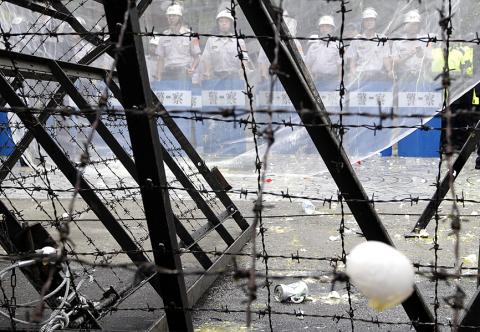Thousands of people involved in the poultry industry nationwide braved the rainy weather yesterday to protest outside the Council of Agriculture in Taipei against the council’s order that chickens must be electronically slaughtered in certified slaughterhouses. The demonstrators said the new policy threatens their livelihoods.
Some of the protesters held banners accusing the government of “forcing the people to revolt,” while others threw rotten eggs, water bottles and flag poles at the council building — and the police deployed to guard it.
“I have five people to feed in my family with my small chicken farm, but now that traditional slaughtering is banned, I have to travel two hours back and forth to take the chickens to certified electrical slaughterhouse in Fengshan District (鳳山), Greater Kaohsiung. Sometimes the dead chickens go bad on the return trip, especially in the summer heat,” a farmer who identified himself as A-ching (阿清) from Kaohsiung’s Meinong District (美濃) told the crowd.

Photo: Pichi Chuang, Reuters
“Sometimes the slaughterhouse refuses to take my order, since it only starts the machine when there are at least 500 chickens,” she said.
A-ching said her business has been seriously affected since the order was imposed on May 17.
“What am I going to do to feed my family if I cannot make a living anymore?” A-ching said. “Are you going to feed my family, President Ma Ying-jeou (馬英九)?”

Photo: Pichi Chuang, Reuters
The crowd responded with a round of applause and airhorn blasts.
Taiwan Rural Front spokeswoman Frida Tsai (蔡培慧) said that while Council of Agriculture Minister Chen Bao-ji (陳保基) has repeatedly said the 83 certified poultry slaughterhouses nationwide were enough to meet demand, “it was a total lie.”
“The Poultry Association recently telephoned each of the 83 slaughterhouses for a poll. Only 47 provide slaughtering services for non-associated chicken farmers,” Tsai said.
Lee Wen-yang (李文揚), the second-generation owner of a popular poultry shop in Taipei’s Nanmen Market (南門市場) founded by his parents 50 years ago, said the capacity of the slaughterhouses was not sufficient to meet demand.
“My shop opens at 6am, but the poultry slaughterhouse is so jammed that often we cannot get our chickens until noon, and by that time the shopping crowd is gone,” Lee said. “The [slaughterhouse’s] quality of service is poor too. My mother and I have to spend a lot of time cleaning the chickens before putting them on shelf.”
The unequal distribution of the slaughterhouses around the country was also an issue, the protesters said, because there is only one certified electrical poultry slaughterhouse for Taipei and New Taipei City (新北市), which have a combined population of more than 6 million people.
There were minor clashes between the demonstrators and police, with the protesters pushing at police barricades.
Council of Agriculture Deputy Minister Wang Cheng-teng (王政騰) met with a 10 representatives from the protesters, but the two sides were not able to reach an agreement. After the meeting, the demonstrators marched to the Presidential Office for another protest.

‘DENIAL DEFENSE’: The US would increase its military presence with uncrewed ships, and submarines, while boosting defense in the Indo-Pacific, a Pete Hegseth memo said The US is reorienting its military strategy to focus primarily on deterring a potential Chinese invasion of Taiwan, a memo signed by US Secretary of Defense Pete Hegseth showed. The memo also called on Taiwan to increase its defense spending. The document, known as the “Interim National Defense Strategic Guidance,” was distributed this month and detailed the national defense plans of US President Donald Trump’s administration, an article in the Washington Post said on Saturday. It outlines how the US can prepare for a potential war with China and defend itself from threats in the “near abroad,” including Greenland and the Panama

A magnitude 4.9 earthquake struck off Tainan at 11:47am today, the Central Weather Administration (CWA) said. The hypocenter was 32.3km northeast of Tainan City Hall at a depth of 7.3km, CWA data showed. The intensity of the quake, which gauges the actual effect of a seismic event, measured 4 in Tainan and Chiayi County on Taiwan's seven-tier intensity scale, the data showed. The quake had an intensity of 3 in Chiayi City and County, and Yunlin County, while it was measured as 2 in Kaohsiung, Nantou County, Changhua County, Taitung County and offshore Penghu County, the data showed. There were no immediate reports of

The Chinese Nationalist Party (KMT) is maintaining close ties with Beijing, the Democratic Progressive Party (DPP) said yesterday, hours after a new round of Chinese military drills in the Taiwan Strait began. Political parties in a democracy have a responsibility to be loyal to the nation and defend its sovereignty, DPP spokesman Justin Wu (吳崢) told a news conference in Taipei. His comments came hours after Beijing announced via Chinese state media that the Chinese People’s Liberation Army’s Eastern Theater Command was holding large-scale drills simulating a multi-pronged attack on Taiwan. Contrary to the KMT’s claims that it is staunchly anti-communist, KMT Deputy

RESPONSE: The government would investigate incidents of Taiwanese entertainers in China promoting CCP propaganda online in contravention of the law, the source said Taiwanese entertainers living in China who are found to have contravened cross-strait regulations or collaborated with the Chinese Communist Party (CCP) could be subject to fines, a source said on Sunday. Several Taiwanese entertainers have posted on the social media platform Sina Weibo saying that Taiwan “must be returned” to China, and sharing news articles from Chinese state media. In response, the Mainland Affairs Council (MAC) has asked the Ministry of Culture to investigate whether the entertainers had contravened any laws, and asked for them to be questioned upon their return to Taiwan, an official familiar with the matter said. To curb repeated